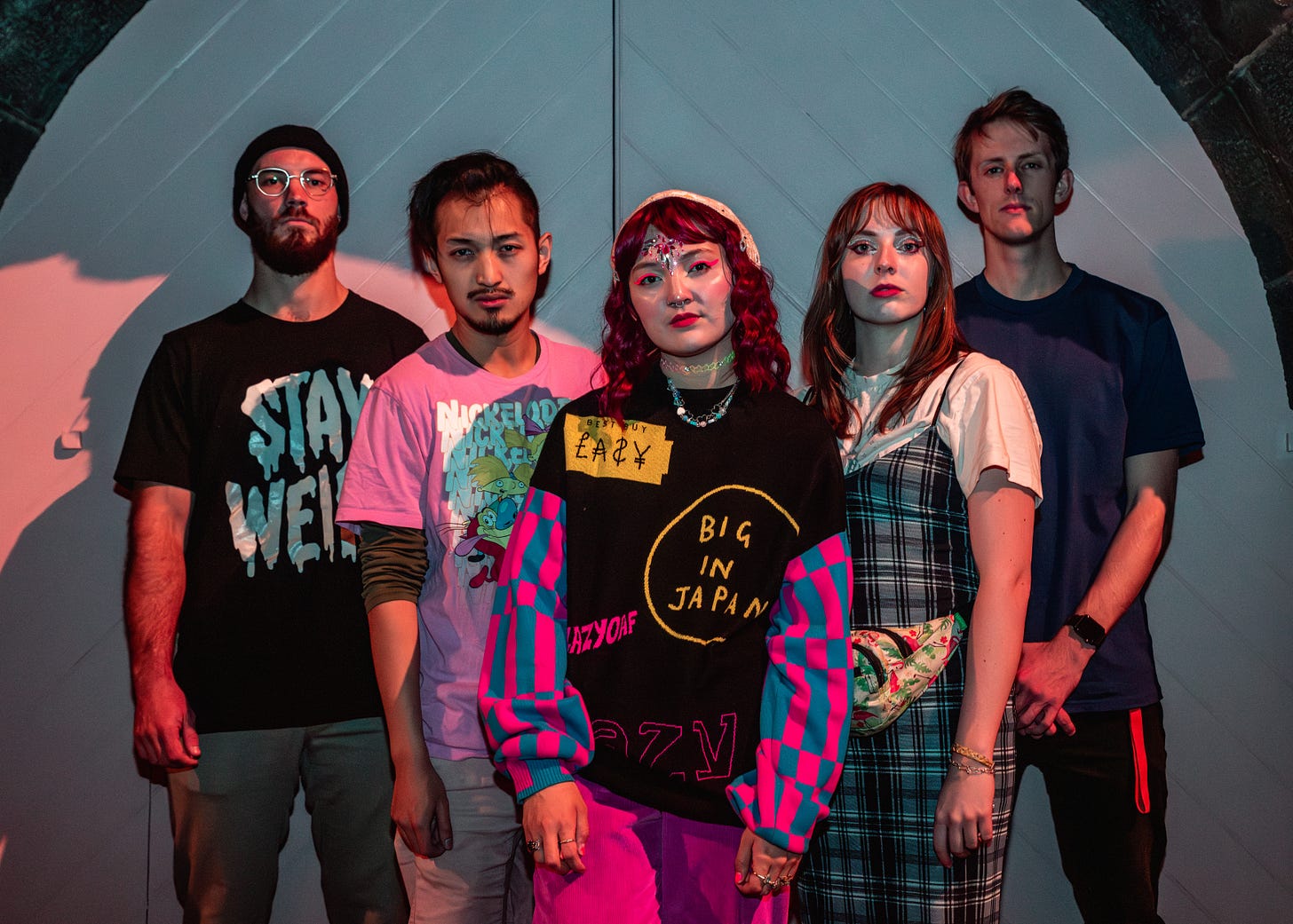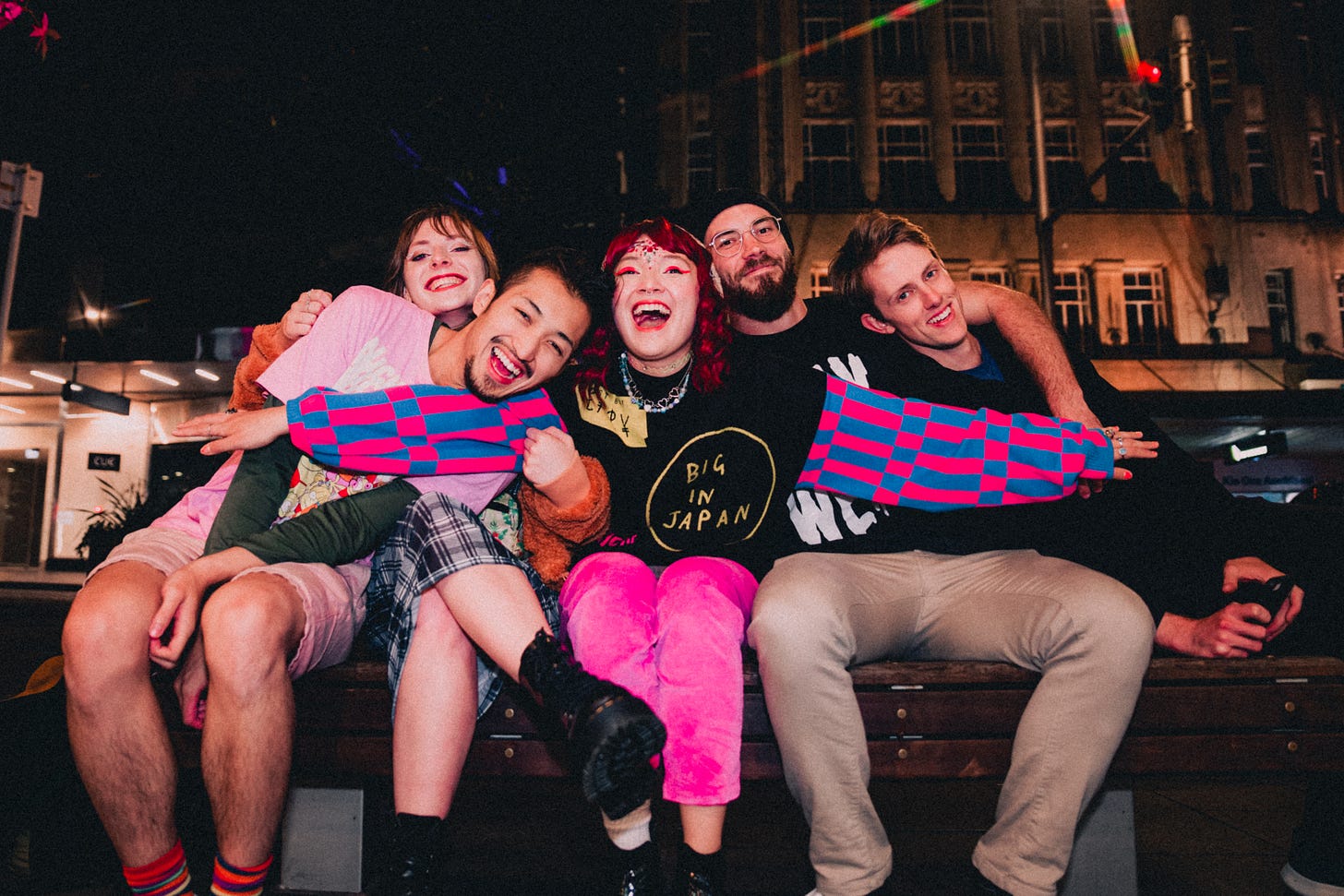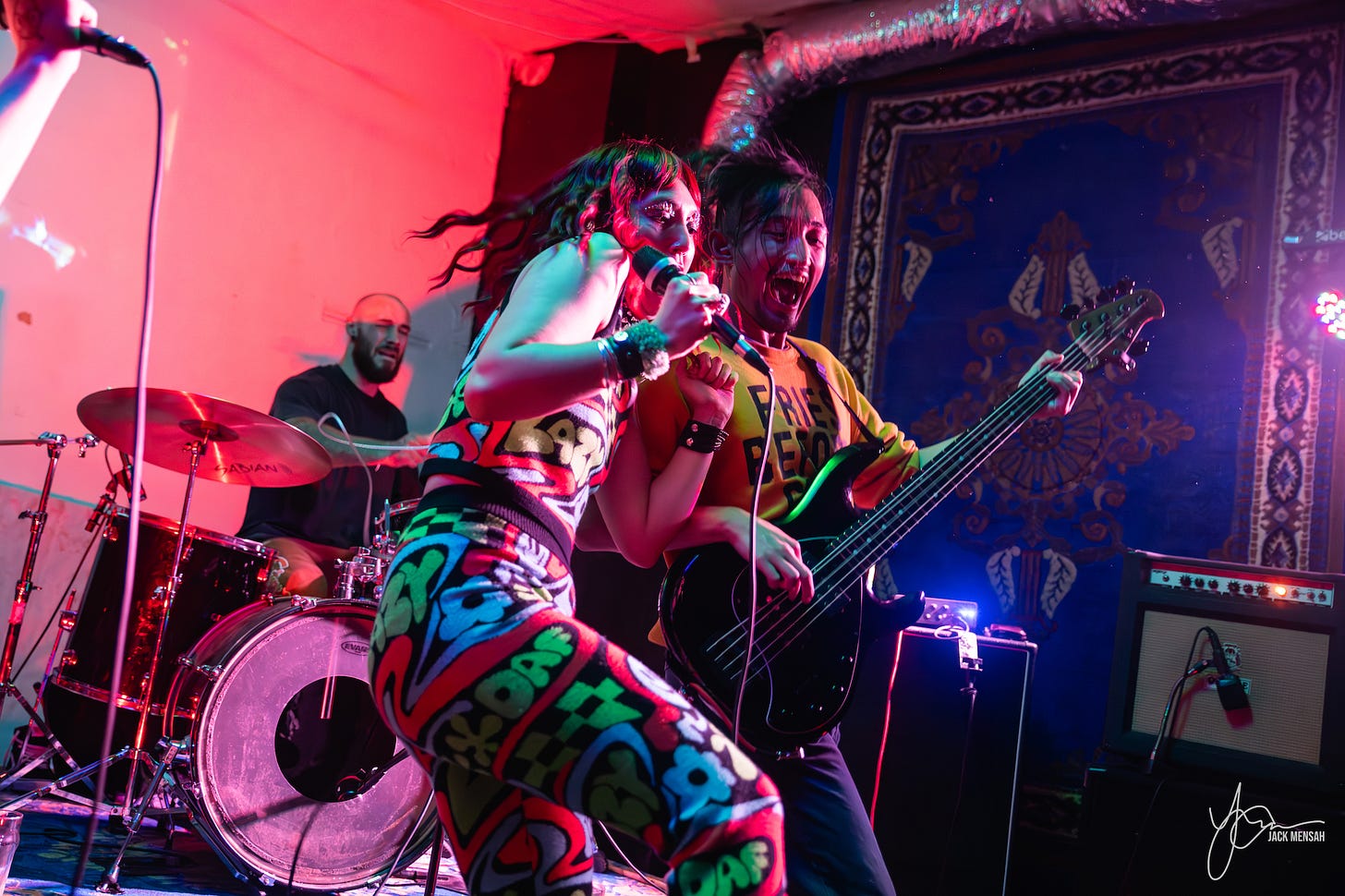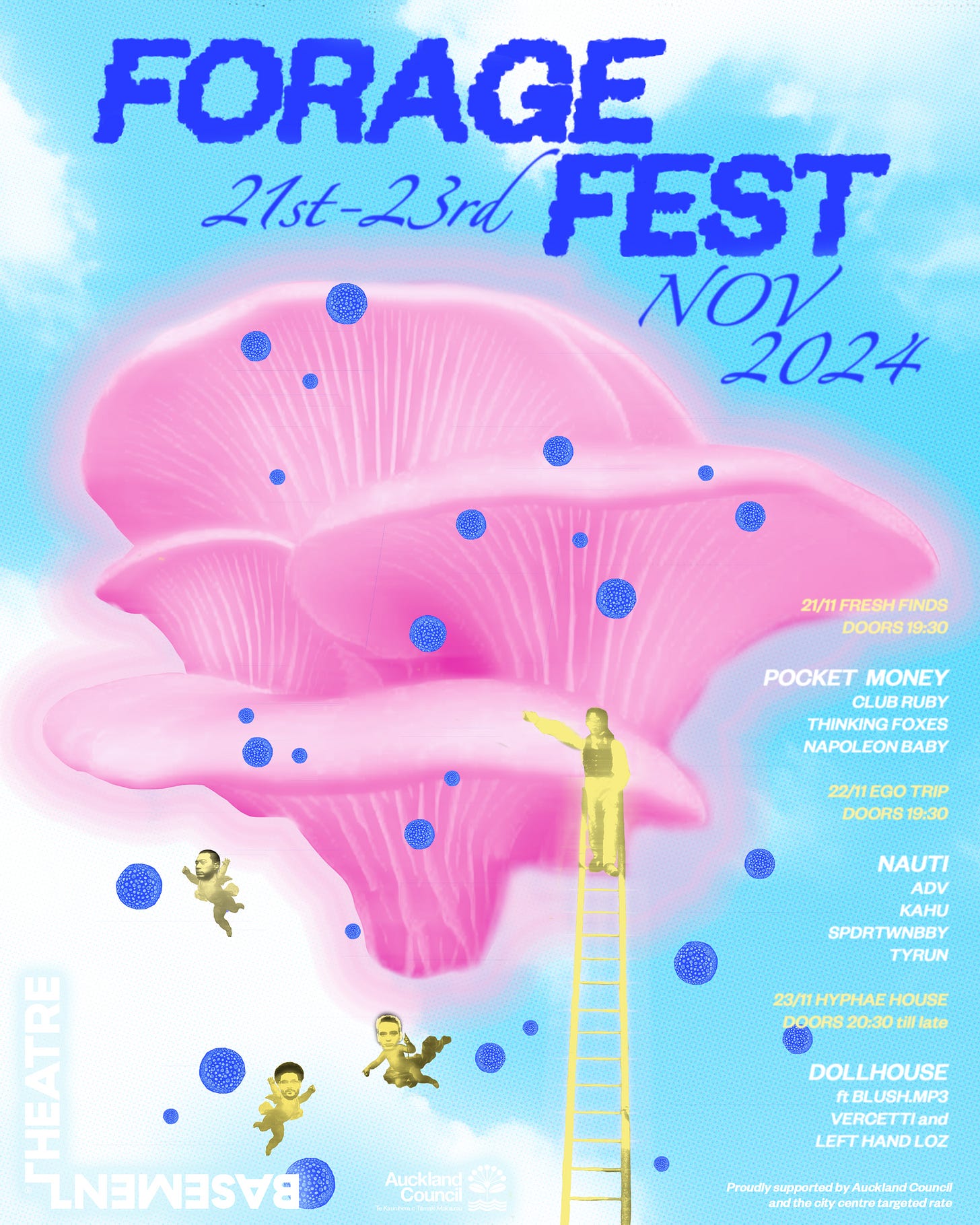An Interview with Club Ruby - INTERVIEW
Club Ruby are bringing their dynamic performance chops to Forage Fest 21-23 November. They discuss their innovative approach to creating unforgettable musical experiences.
Club Ruby have been busy in the local scene, with a long slew of dynamic performances under their belt. We sat down to discuss how they bring their love of theatre into their performance, and how their unconventional approach to musical experiences sets them apart. Made up of President Ruby, Vice President Hon, JJ Sticks, Jonathan the Computer and Bubbles the Barbarian, Club Ruby have joined the lineup for Forage Fest, a new music festival that champions the young, new and emerging artists of Tāmaki’s underground, and is completely free to attend.
A. Tell me the story of Club Ruby.
R. We all went to uni together, doing either the jazz or popular music degree, which is more songwriting and production. So myself, President Ruby, and also Sophie Gibson, aka Bubbles the Barbarian, and Jonathan Meyer, aka Jonathan the Computer, all went to pop school.
H. And I went to jazz school, Vice President Hon, along with Josh Johnston, aka JJ Sticks, our drummer.
R. We were all kind of in each other's circles. The band Underscore, which comprises of Hon, Josh and Jonathan were playing already for a couple years.
H. We were also playing for all the pop students’ finals presentations,
R. At one point, Hon was playing for 14 different bands.
A. How is that humanly possible?
H. I scheduled my poops and timed them. It got down to the minute. It was crazy. My favourite manoeuvre was “Sorry, guys, I'm gonna be 10 minutes late — I just missed the bus,” but then I would just take a nap somewhere in the building. I would be at uni from 7am to 11pm.
R. And then, the member who's not in our live band anymore, Reuben Hudson — I started writing some songs with him, kind of post pandemic, and then we found our sound through exploring that more indie rock, early 2000s sound. Before, I wasn't sure that was the direction I wanted to go. I was writing quite acoustic, sad girl music, but I didn't love that for me. So, yeah, I think that's when Club Ruby was born. And then we started gigging around. And then we really honed in on what Club Ruby is today.
H. It really felt like Club Ruby when we got Sophie in on the Tuning Fork gig.
R. Yeah, Reuben had moved to Melbourne by then. We kind of had to reform who we were.
A. So you all started out as friends from uni, but what happens after uni? What was the trajectory for Club Ruby?
R. I'm the last to graduate. So my last year was when we went hard. We started doing our releases. We recorded at the Kenneth Meyer Center, which is at the university, and then we started actually getting funding to do all the singles.
H. The Asians in Music Sandpit — that really got us off the ground.
R. Yeah, I think so, because they paired us up with our mentor, Mareea Patterson. And we got some singles through that. We recorded at the Lab, and then Roundhead. And then we started working with Christian Tjandrawinata. First we weren't even recording to a click, and then he begged us to record to a click. Our first EP was not to a click at all. And now we're gonna drop some singles that will feature a click.
A. Is that the main feature of each song?
R. They sound way more in time. It's not as messy.
A. You guys really stood out to me in terms of the way that you perform, because you're all big, boisterous performers, and it's quite different in the New Zealand scene, where everyone's quite muted and very contained. How did you come about your performance style?
H. When we were operating as Underscore, I guess we kind of recognised the importance of performance. And then throughout uni as well, that was all taught. Personally, I just really wanted to be a rock star. I was practicing the moves in front of the mirror with the bass on. I wanted to express how the music was making me feel physically, because that was also how I was taught. You know, you feel rhythm better when you feel it through your body, so you play in time better.
R. For me personally, I come from a musical theatre background. I was practicing in front of the mirror doing my performances, but they were all… and then you step over here, and then you walk over there, and then your big moment is in the spotlight. So I think I had to rediscover how I would perform as I started pursuing my own music. I actually think it came with my confidence as well. I feel like I went through some dark times after graduating high school. My confidence kind of went out the window. And as I went through uni and started honing in on my own songwriting craft, you become quite vulnerable if you're sharing things for the first time like that in front of other people. So I think as we discovered our sound, I learned that I wanted to be more high energy, that I didn't actually want to be an acoustic, sad girl for the rest of my career, and that I wanted to be moving around again. Through feeling comfortable expressing myself lyrically with the band, I found that I do not like performing by myself. I much prefer having a band, and that lets me feel like I can let go and just kind of go crazy, especially if they're going crazy — why would I not go crazy?
A. Having seen you guys perform before, I noticed that there's a lot of synergy in your movement as well. I don't know whether it's choreographed or if it's just in the moment, but being in the audience, it was just so much fun to watch.
H. Yeah, it's not choreographed. I give a lot of credit to Massive Theatre. I went to a lot of their workshops. And there was a lot of… I don't remember what it was called… but it was just being aware of your surroundings with other actors and performing improvised movements with them.
R. I think we did 26 gigs last year. I think we were doing a gig at least every other week. Just doing that, we started moving. Some people don't know what to do with their hands — I would just express what the lyrics were, that I was singing on the phone, or a heart or whatever, and Sophie would kind of just do the same. We would just pick up little habits that we would start doing anyways, and then it probably did get refined just because we were doing so many different shows. Yeah, it also helps that we’re all friends.
A. And you really get a sense of that when you see you guys perform live. And one thing that I did notice is the use of quite unconventional instruments. Do you want to speak to that?
R. I was in choir growing up, and you had to choose between choir or band or orchestra. If I had to have been in orchestra or band, I think I would have loved doing percussion, because I have ADHD. So I think the idea of being able to play a hundred different instruments is way more exciting than having to practice one. So I think it is my dream one day to have a whole table in front of us with a bunch of different things — a little plastic saxophone, some shakers, kazoos. The kazoo kind of came up because we did an acoustic gig. I don't like playing guitar live, even though I write on guitar. So I was like, “What could I do with my voice that would be like a guitar solo… why not a kazoo?” I think I'll add recorders soon as well.
A. It definitely stood out. I was like, “Oh, okay they're quite experimental in the way they use unconventional instruments in a indie punk setting.” Who are your main influences as Club Ruby? Who do you draw on to influence your sound and the aesthetic of Club Ruby?
R. I listened to a lot of early 2000s rock bands in my emo era. I was listening to My Chemical Romance, Weezer, Radiohead. But I think those are a little more dark in terms of aesthetics. I've recently listened to the band FIZZ, that I really like. They released a cool album. I think it's kind of mashing colourful even anime style with kind of early 2000s rock for me. Also, Nicolas Cage in this video specifically, at around 0:35. That’s one of my influences in performance and fashion.
H. I love Midwest emo music, like Origami Angel, Hot Mulligan. I mean, growing up was a similar thing — Radiohead, Fallout Boy. I know Josh got into Fallout Boy as well. He also plays for a lot of musical theatre. He played for Matilda. And I would always take Josh out to musicals.
A. How do you feel that musical theatre influence coming through in Club Ruby? You talked about it through the performance, but do you think that it influences the songwriting or the sonic aesthetic of Club Ruby?
R. Absolutely! Definitely! I think even just the fact that I love having a persona, and maybe that's why I don't want us to be a completely dark looking all black rock band. I realised that all these bands I'm listening to, none of them look like me. None of them are singing lyrics that quite represent my story or my background as a POC or as a femme born person. And then aesthetically, not being afraid to be out there, which musical theatre taught us. And wearing a wig.
H. Song structure as well. It does feel like story based songwriting. Some sections don't even repeat at all, or they just completely lose the plot by the end.
R. We have gotten some feedback like, “oh, why are you not repeating this section?” or “why do you not have a chorus?” like in our latest song, Dear Diary. I think it is because I always have a story, at least in my head, if it doesn't make it into music video form. Like Dear Diary is me trying to write in my diary. When the chorus hits, it's just a guitar riff for the first couple of times. And that's because sometimes I can't get anything out. I can't write anything. And then finally it comes out in the end. “Dear Diary, still find it hard to breathe, cried the third time this weekend, and damn it, I'm still suffocating.” I think staying true to our vision, whether it's in our head and other people understand it or not, is important to us.
A. Forage Fest is all about celebrating young, new and emerging artists on the scene. Which emerging artists inspire you at the moment? Who are you excited about?
R. I've been jamming spdrtwnbby. I really liked her beats and how lush it sounds. So I was excited to see her on the lineup, and I really liked the collab she did with Romiin - Fruits in the Diaspora. It felt real — you know talking about eating pies at the dairy in West Side. And Romiin's really cool. He was in the Asians in Music Sandbox programme as well. And then Thinking Foxes are our homies. I love them. I was really excited to see them on the lineup, as well as Pocket Money. We’ve played with them before.
H. CCTV. I loved their live shows.
R. They're very inspiring as well with their storytelling and just how they let loose, and their crowd work. I love that Forage Fest is not for a specific niche — you're really just uplifting a lot of different types of emerging artists, all at different stages, with different types of social media platforms.
H. I'm excited to see my buddies.
A. Do you have anything exciting in the works?
H. Can we plug our video game that came out this year?
A. Yes, of course — talk more about that.
H. Basically, I did a coding course where I met Finn Johannson, who really wanted to make video games. And once we graduated, he approached us and asked if he wanted a music video game. I imagined it'd be a really simple 2D scroller, you know, like a really short story. And then one and a half years later, he comes up with this first person, full on 3D animated video game that was released on Steam.
R. And he was coming up with a hundred different iterations of ideas, and then would drop off to go work on it. And we didn't know what was going on. So when he finally showed it to us, we were like, wow!
H. And he really understood the meaning of the song, and the vision. It was incredible.
R. It's called Was God Birthed!?, which is after our debut EP of the same title with the song, Was God Birthed!?. It's just exploring a museum from the perspective of little President Ruby, maybe 12 years old, wanting to see the dinosaurs, but their dad is against it, for whatever religious ideology he has. So they just sneak in and lock the door behind them. And then you have to explore the museum with the premise of your dad chasing you throughout the song, and then at the end, he'll catch you if you haven't found the Club Ruby rave in time.
H. I think it loops now — he gets stronger and faster.
R. Oh, he gets stronger faster. There's a lot of different plinths with little descriptions and little items in there. You can unlock all the rest of the songs from the EP.
A. Do you have any other unconventional projects coming out?
R. We're gonna make a radio show. This is a super, super sneak preview. We're wanting to do a project called Club Ruby Radio, which will include all of our friends within the community that have been on their own radio shows, that have made their own podcasts, and they'll make fake radio segments to introduce each of the tracks. Our plan is to also collaborate musically with all of our friends, and all the different artists around Aotearoa that we've come across regardless of genre. So we can invent an easy, breezy, lemon squeezy show and do some folk songs, or ask spdrtwnbby to do a beat with us, and then have a little pop, lush radio station. And I think it'll be really fun.









